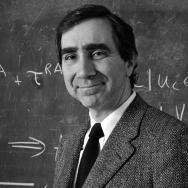University of Chicago leaders and colleagues joined friends and family of the late Hugo Sonnenschein this past weekend to honor the University’s 11th president, share their warm personal memories, and reflect on his profound impact as a leader, economist and mentor.
Sonnenschein, who led the University through transformative change during his tenure from 1993 to 2000, died July 15, 2021 at age 80. He was remembered at an April 30 memorial service at Rockefeller Memorial Chapel as someone who had an ambitious vision for the University, along with personal kindness as a colleague and friend.
“In the arc of any university, each president plays an important role in helping the institution, and the community it comprises, to evolve and to grow,” said President Paul Alivisatos. “Often, it is only with the passage of time that the full scale of the impact of such changes can be fully understood and appreciated.”
Alivisatos noted that the foundational work that Sonnenschein did laid the groundwork for the remarkable transformation of the College. “Of course, not everybody agreed with Hugo about his ideas—and it wouldn’t be the University of Chicago if they had. But I think we can all agree that his ideas have stood the test of time,” Alivisatos said.
Chancellor and President Emeritus Robert J. Zimmer said Sonnenschein was able to create long-lasting impact through an independence of perspective and questioning, which he applied equally—whether he was solving an economics problem or leading the University.
“His focus on thinking through what the right questions are, and the right way to approach them, was very powerful,” Zimmer said. “He was deeply committed to that. That made him an important and impactful leader.”
As president, Sonnenschein enacted a series of changes to strengthen the University, including growing the size of the College while maintaining the strength of UChicago’s renowned graduate programs. He also spearheaded improvements to the quality of student life and commissioned the first campus master-planning process in 30 years.
Joseph Neubauer, chair of the University’s Board of Trustees, remembered Sonnenschein’s innovative, broad thinking and “indomitable will to get things done.”
“I still remember him saying at several board meetings: ‘When your friends and family call you for help to get their children into UChicago, then you know that we’ve really arrived,’” Neubauer said. “Well, I’m happy to report that we’ve fulfilled and exceeded your vision—and your mission.”
Steven Poskanzer, former chief of staff to Sonnenschein, said his mentor never stopped being a teacher, even when he became a University leader. “Only the nature of his classroom and his students shifted. Working alongside Hugo, watching him, was like being Hugo’s doctoral student in the field of academic leadership,” said Poskanzer, who went on to serve as president of SUNY at New Paltz and of Carleton College.
“He was the finest and most caring of mentors, who changed my life for the better, and was a pillar of joy and friendship for me and my family,” Poskanzer added. “It’s not every UChicago president, you know, who will personally deliver Medici pizza to your house.”
Poskanzer wasn’t alone in recalling Sonnenschein’s thoughtfulness. Geoffrey Stone, the Edward H. Levi Distinguished Service Professor of Law at UChicago, described Sonnenschein as “the right man, at the right time, at the right place.” Not only did Sonnenschein ask himself how he could add value to an institution, he did so without the self-interest of limiting his own risk. Rather, he placed the University’s interest above that of his own ego.
Stone, whom Sonnenschein recruited to serve as UChicago provost, recalled how the president opted against the tradition of walking into the Convocation ceremony last and by himself. Instead, he gently took Stone’s arm, pulled him back, and said, “Walk with me.”
“I am proud to say that I have ever since, and will continue to do for the rest of my days,” Stone said.
Sonnenschein’s impact also extended far beyond the University and its Hyde Park campus. Renowned economists Andreu Mas-Colell—founder of the Barcelona School of Economics and professor at Universitat Pompeu Fabra in Spain—and Richard Kihlstrom of the Wharton School at the University of Pennsylvania both spoke of their late colleague and friend as a generous spirit who treated his students as colleagues and helped, even from afar.
The public memorial came after a two-day conference that the Becker Friedman Institute for Economics had convened to honor Sonnenschein. A member of the University community for nearly three decades, he most recently served as the Charles L. Hutchinson Distinguished Service Professor Emeritus in the Kenneth C. Griffin Department of Economics.
Sonnenschein is survived by his wife, Elizabeth Gunn Sonnenschein; their three daughters, Leah Schraudenbach, Amy Venetianer and Rachel Mossi; and five grandchildren.
His daughters, in a joint statement, said that their father’s greatest fortune was attending the University of Rochester and meeting their mother. They spoke of his unconditional love, and how he taught them the importance of honesty and curiosity as well as how to parallel park, right an upturned canoe, and how to build a fire and clean it up.
Addressing his grandchildren, they concluded: “He loved you. You stretched him, and he appreciated the stretching. He lives on in you.”
